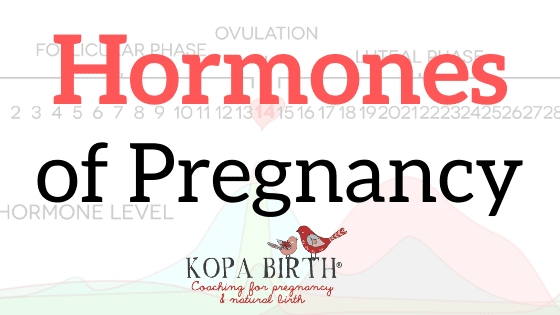
Hormones. From nausea to nightmares, they’re the culprits behind many of the symptoms and challenges of pregnancy. You’ll hear about hormones in many of our Kopa Birth week by week pregnancy posts. While you may at times feel like cursing the source of your discomfort, they’re also vital for normal reproductive function. Let’s learn more about the hormones of pregnancy.
Estimated reading time: 5 minutes
Hormones are the chemicals that act as messengers, telling our bodies how to function (1). It is fascinating to learn how a simple variety of hormones, when in balance and working together, help prepare your body for pregnancy, enable you to conceive, and maintain the pregnancy.
Estrogen is the primary female sex hormone and one of the more well-known hormones of pregnancy. Initially, estrogen is produced in the ovaries. By around week 7 or 8 of pregnancy, the placenta becomes the primary producer of this hormone.
Progesterone is the hormone most commonly known for helping your body maintain, or keep a pregnancy, after conception. In fact, health care providers sometimes give progesterone late in pregnancy if a woman has previously had a premature baby, as it can help prevent premature birth. As with estrogen, it’s initially produced by the ovaries and then later by the placenta.
Follicle-stimulating hormone (FSH) is made by the pituitary gland, a small organ at the base of the brain. It causes an egg to ripen in one of the ovaries each month (1).
the Pituitary gland also makes luteinizing hormone (LH). After FSH has caused an egg to ripen, LH triggers its release from the ovaries.
Gonadotropin-releasing hormone (GnRH) is yet another pregnancy hormone made by the hardworking pituitary gland. It signals to the body to produce FSH and LH.
Many women have heard of human chorionic gonadotropin (hCG) because it is the hormone that urine and blood pregnancy tests detect. It’s only produced during pregnancy and originates in cells from the fertilized and dividing egg. Later, the placenta produces it. hCG signals the ovaries to increase production of estrogen and progesterone for the first few months before the placenta gets up to speed.
Prostaglandins increase later in pregnancy, encouraging your cervix to soften and ripen in preparation for effacement and dilation. As labor begins, prostaglandins encourage contractions in smooth muscle like the uterus, helping to trigger labor.
Human placental lactogen is produced by the placenta. It is one of the pregnancy hormones that helps in the stimulation of milk glands in the breasts, so that your body is ready to provide nutrition to baby after delivery.
Ocytocin is the hormone responsible for stimulating contractions of your uterus during labor. You have likely heard of its synthetic counterpart, Pitocin, which is often used to medically induce labor. Oxytocin is also responsible for the let-down reflex that encourages milk flow during breastfeeding.
It may feel like your hormones are running wild, causing all kinds of disturbances. From causing physical phenomenons like morning sickness to emotional struggles like depression, hormones have you caught in their grip. However, as you’ve just read, they are vital to a healthy pregnancy. Hopefully now you can take some comfort in knowing how much good these crazy hormones are doing in your body.
Kopa Birth’s online birthing classes allow you to prepare for a natural hospital birth from the comfort of your own home, 24/7. Enroll today in our free online childbirth class and start preparing for your natural birth!
References:
Hormones. From nausea to nightmares, they’re the culprits behind many of the symptoms and challenges of pregnancy. You’ll hear about hormones in many of our Kopa Birth week by week